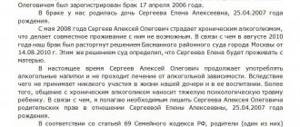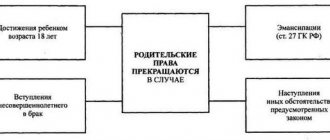Article 66 of the RF IC. Exercise of parental rights by a parent living separately from the child
1. A parent living separately from the child has the right to communicate with the child, participate in his upbringing and resolve issues regarding the child’s education.
The parent with whom the child lives should not interfere with the child’s communication with the other parent, if such communication does not harm the child’s physical and mental health or his moral development.
2. Parents have the right to enter into a written agreement on the procedure for exercising parental rights by a parent living separately from the child.
If the parents cannot come to an agreement, the dispute is resolved by the court with the participation of the guardianship and trusteeship authority at the request of the parents (one of them). At the request of the parents (one of them) in the manner established by civil procedural legislation, the court, with the obligatory participation of the guardianship and trusteeship authority, has the right to determine the procedure for the exercise of parental rights for the period before the court decision enters into legal force.
3. In case of failure to comply with a court decision, the measures provided for by the legislation on administrative offenses and the legislation on enforcement proceedings are applied to the guilty parent. In case of malicious failure to comply with a court decision, the court, at the request of a parent living separately from the child, may make a decision to transfer the child to him based on the interests of the child and taking into account the opinion of the child.
4. A parent living separately from the child has the right to receive information about his child from educational organizations, medical organizations, social service organizations and similar organizations. The provision of information may be refused only if there is a threat to the life and health of the child on the part of the parent. Refusal to provide information may be challenged in court.
Return to the table of contents of the document: Family Code of the Russian Federation in the current edition
Comments on Article 66 of the RF IC, judicial practice of application
Explanations of the Plenum of the Supreme Court of the Russian Federation:
Some explanations on the application of the provisions of Article 66 of the RF IC are given in paragraph 8 of the Resolution of the Plenum of the Supreme Court of the Russian Federation dated May 27, 1998 N 10 “On the application of legislation by courts in resolving disputes related to the upbringing of children,” which states the following.
“In accordance with paragraph 2 of Art. 66 of the RF IC, parents have the right to enter into a written agreement on the procedure for the exercise of parental rights by a parent living separately from the child. If the parents cannot come to an agreement, the dispute that has arisen is resolved by the court at the request of the parents or one of them with the participation of the guardianship and trusteeship authority.
Based on the right of a parent living separately from the child to communicate with him, as well as the need to protect the rights and interests of a minor when communicating with this parent, the court, taking into account the circumstances of each specific case, should determine the procedure for such communication (time, place, duration of communication and etc.), setting it out in the operative part of the decision.
When determining the order of communication between a parent and a child, the child’s age, state of health, attachment to each parent and other circumstances that can affect the child’s physical and mental health and moral development are taken into account.
In exceptional cases, when communication between a child and a parent living separately may cause harm to the child, the court, based on paragraph 1 of Art. 65 of the RF IC, which does not allow the exercise of parental rights to the detriment of the physical and mental health of children and their moral development, this parent has the right to refuse to satisfy the claim to determine the procedure for his participation in the upbringing of the child, setting out the reasons for the decision made.
Similarly, the requirement to remove obstacles to parents who have not been deprived of parental rights in raising children who are with other persons on the basis of a law or decision should be resolved.
Having determined the procedure for the participation of a separately living parent in raising a child, the court warns the other parent about the possible consequences of failure to comply with the court decision (Clause 3 of Article 66 of the RF IC). A malicious failure to comply with a court decision, which may be the basis for satisfying the request of a parent living separately from the child to transfer a minor to him, may be regarded as the defendant’s failure to comply with the court decision or the creation of obstacles for its execution, despite the application of measures provided for by law to the guilty parent.” .
Explanations of the Supreme Court of the Russian Federation in the Review of Practice 2011:
Some clarifications were given by the Supreme Court of the Russian Federation in the Review of the practice of resolving disputes related to the upbringing of children by courts (Review approved by the Presidium of the Supreme Court of the Russian Federation on July 20, 2011):
Taking into account the parent’s living conditions, the child’s daily routine and others when determining the order of communication with the child
“When determining the order of communication between a parent and a child, the age of the child, his state of health, attachment to each of the parents and other circumstances that can have an impact on the physical and mental health of the child and his moral development are taken into account.
The study of judicial practice showed that in addition to the above circumstances, the courts also took into account the presence or absence of conditions for the upbringing and development of the child in accordance with the act of examining living conditions (availability of sleeping and playing places, etc.); daily routine of a young child; the distance between the plaintiff’s place of residence and the child’s place of residence; the length of time during which the child did not communicate with the parent, and other circumstances.”
Taking into account the characteristics of the child, his state of health, age, experience of communication with the parent
“...taking into account the circumstances of a particular case, the claims of a parent living separately from the child were often partially satisfied by the court, and the procedure for communication with the child was determined differently than that stated by the parent. The determination, in particular, of a different length of time for communication with a child was associated primarily with the individual characteristics of the child, his age, state of health, the child’s lack of experience in communicating with a parent living separately from him, as well as with the parents’ work schedule.”
For what period should the order of communication with the child be determined?
“In a number of cases, the court, taking into account the small age of the child and the fact that the child had not seen the plaintiff (father or mother) for a long time, had become unaccustomed to him, prescribed different communication procedures for the first months after the decision entered into legal force and for the following time..
The procedure for communication between a parent and a child is determined by the court based on the provisions of paragraphs. 1 and 2 tbsp. 66 of the RF IC specifically for the future. The time period is until the child reaches adulthood, unless otherwise indicated in the statement of claim. The procedure for communicating with a child, if necessary, can be changed by the court at the request of any parent, and when the child reaches the age of fourteen years - at the request of the child himself” (Clause 2 of Article 56 of the RF IC).
Taking into account the child’s opinion when determining the procedure for exercising parental rights (communication procedure)
“There have been cases when the courts, when resolving disputes about determining the procedure for the exercise of parental rights by a parent living separately from the child, unreasonably did not take into account the opinion of a minor child who has reached the age of ten years about the procedure for his communication with a parent living separately from him.”
An indication in the court decision of the parent’s right to participate in raising the child, the right to know about the child’s whereabouts, the right to receive information about the child’s health status , etc.
In the Review of the practice of resolving disputes related to the upbringing of children by courts, approved by the Presidium of the Supreme Court of the Russian Federation on July 20, 2011, the attention of the courts was drawn to the fact that in the operative part of the decision the court can indicate not only a certain procedure for communication with the child, but also the implementation other parental rights. Thus, in particular, the Review states that
“..in some cases, in the operative part of the decision, in addition to indicating the order of communication between the parent and the child, the courts also indicated the possibility of the separately living parent exercising other parental rights, if the requirement for this was stated to the court.
Thus, in particular, in the operative part of the decisions, the courts pointed to the right of the separately living parent to participate in raising the child and resolve issues related to obtaining an education; the right to receive information about the child’s health status, sleep and nutritional patterns, emerging needs, the child’s location, the location of the child care institutions the child attends; the right to visit an inpatient medical institution if a child is there, as well as the right to offer health care institutions for the treatment of the child; the right to telephone or Internet communication.
In addition, in the operative part of the decision (or in the settlement agreement approved by the court), in a number of cases (if this was stated by one of the parties), the responsibilities of the parents were also indicated :
treat each other correctly so as not to undermine each other’s authority in the eyes of the child; jointly resolve issues related to the education and upbringing of a child (courts of the Rostov region);
jointly resolve issues of the child’s participation in sports competitions and tournaments and preparation for them; promote the moral development of the child, do not attend sessions with him or her that show films containing scenes of cruelty and violence, as well as other events that may negatively affect the mental health of the child (on the part of the father); do not interfere with communication between father and son at his request through correspondence, by telephone and via the Internet (on the mother’s side); not to form a negative opinion about each other in the child (courts of the Republic of Tatarstan);
bear the costs of the child attending sports and educational institutions in equal shares, taking into account the age and in the interests of the child (Engelssky District Court of the Saratov Region), etc.
This practice is correct and deserves the attention of the courts of those regions where it does not exist.”
The law does not provide for pre-trial dispute resolution
“From the contents of Art. Art. 65, 66 of the RF IC, it does not follow that in order to determine the place of residence of children or the procedure for the exercise of parental rights by a parent living separately from the child, the legislation provides for a preliminary pre-trial procedure for resolving the dispute. In the event of a dispute, parents have the right to apply for resolution directly to the court” (Review of the practice of resolving disputes related to the upbringing of children by courts, approved by the Presidium of the Supreme Court of the Russian Federation on July 20, 2011)
Jurisdiction of the dispute – district court
“According to Art. 24 of the Code of Civil Procedure of the Russian Federation, all categories of cases related to the upbringing of children, from the point of view of the rules of patrimonial jurisdiction, are considered by the district court as a court of first instance. Based on this, it should be considered a violation of the procedural law to return the application by the district court due to the applicant’s failure to comply with the rules of patrimonial jurisdiction. In particular, some judges of the district court mistakenly believed that applications to determine the place of residence of a child, to determine the order of communication with a child, to limit parental rights were within the jurisdiction of magistrates" (Review of the practice of courts resolving disputes related to raising children," approved by the Presidium of the Supreme Court RF 07/20/2011)
Liability for failure to comply with a court decision
When the court considers the case, the defendant is explained about the need to strictly comply with the decision. If a parent violates the established procedure, he will be held accountable as provided by law.
Bailiffs draw up a protocol where they record specific facts of non-compliance with the court decision. On the basis of it, the violator is brought to administrative responsibility. A fine of one to two thousand five hundred rubles is imposed.
Punishment does not apply to those persons who violate a court order for valid reasons. For example, serious illness, going on a long business trip.
Despite repeated similar punishments, an unscrupulous father or mother may continue to violate the court decision and create obstacles to communication with the child. Sometimes their own selfishness and personal grievances force people to act to the detriment of their own children.
Clause 3 art. 66 of the current edition of the RF IC provides that in such a situation, the other parent has the right to demand that the court transfer the minor to him for upbringing. Such a claim may be satisfied if it does not contradict the interests of the child. In this case, his position must be heard.
Only a violation on the part of an unscrupulous parent is not enough to take away a son or daughter. If the father or mother only wants communication, he needs to turn to the bailiffs and guardianship authorities for help.
Parental Responsibilities
In addition to parental rights, the court in the operative part of the decision also has the right to indicate parental responsibilities. Among others, there may be an obligation to treat each other correctly, with respect, and to resolve certain issues regarding children together. The goals are to protect children from circumstances that may negatively affect their mental health, for example, to protect them from watching films with elements of cruelty, violence, and sexual acts. The operative part may indicate the obligation to bear the costs of educational clubs, sections for children, the purchase of educational literature, and others.
According to Art. 66 of the Family Code of the Russian Federation, communication between a child and a father or mother living separately can be established through extrajudicial and judicial means. The order of such communication may be completely absent if dad (mom) does not wish it. But usually, if there is no agreement, then there is a judicial way to determine the order of communication.







